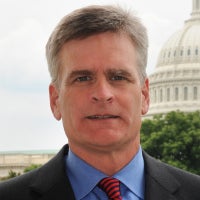When Lindsey Graham and I released our healthcare bill earlier this month, we knew it would elicit a full-throated response. Citizens across this country are deeply concerned about such an important issue, and these days, you simply can’t talk about healthcare without stirring passionate emotions on either side. However, I want to make one thing clear: I will continue to stand strong in the face of any and all criticism of our legislation, because being a U.S. senator means making the tough decisions that aren’t always going to be popular, intelligent, politically viable, or beneficial to your constituents in any way whatsoever.
I’ve been in Congress since 2009 and a senator since 2015, and if there’s one fundamental truth I’ve learned about Washington politics, it’s that there are going to be times when your position on an issue won’t please everyone around you or is spectacularly incompetent or would objectively harm hundreds of thousands of people in your home state alone—and you just have to be okay with that. I know that I am.
Some things just come with the territory as an elected official. I knew that sponsoring this legislation would invite my share of critics and, believe me, I knew exactly what they were going to say. The detractors came out swinging right away, arguing that this bill wouldn’t make me well-liked, that it isn’t a “safe bet” politically, that it was crafted with profound ignorance and staggering callousness, that it’s a looming disaster for millions of families and one of the nation’s largest industries, and that it will unquestionably, within weeks of its passage, cause horrific physical and financial suffering on a mass scale across this nation. But ultimately, I know I just have to tune out all that noise and go with my gut.
Look, I’m fully aware this bill isn’t going to win me any popularity contests. But as an elected representative of the people, any decision you truly stand behind—no matter how much it’s disliked by the establishment or how lethal it is to American men, women, and children—is one you have to stake your name on.
That’s why I’m not going to roll over on this issue just because I hear some naysayers here or there, or because a significant number of the people who voted me into office will die at the hands of my decision, or because anyone with a conscience will never respect me again for championing such an ethically bankrupt and financially cataclysmic bill that will destabilize one-sixth of our economy.
I live by my principles, and I’m not going to do something just because it would make me friends on Capitol Hill, or because it’s sensible, or because it’s fiscally prudent, or because it would actually be helpful to the people of this country. I want everyone in Washington and around the country to know that I will not cave to what’s smart, practical, and resoundingly favored just to score some cheap political points. You don’t put an Obamacare repeal-and-replacement bill like this forward because it’s the popular thing to do—you do it because you believe with the very core of your being in an unwanted, preposterous, unfathomably cruel, politically toxic idea that analysis after analysis has determined will send vast swaths of low- and middle-income America to an early grave. Period.
So when I cast my vote in the senate chamber, you can rest assured that I will not allow myself to be fazed in any way by what the doubters, the TV anchors, nearly every expert in the country, the Congressional Budget Office, the people I represent in Louisiana, the American Medical Association, the American Hospital Association, the American Nurses Association, the American Cancer Society, the AARP, Blue Cross Blue Shield, Kaiser Permanente, the National Health Council, the American Heart Association, the American Lung Association, the American Liver Association, most available research, and virtually all healthcare providers are saying about this bill. I’ll just listen to my heart.
Because at the end of the day, I’m not here to make decisions that people will like, or respect, or that make sense, or to help anyone. That’s just not me.







